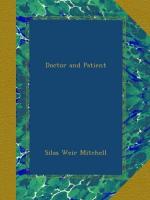If a man could possess in the highest degree and in combination all of the possible extremes of sensory appreciativeness seen in disease, in hysteria, and in the hypnotic state, we should have a being of extraordinary capacities for observation. Taylor, in his “Physical Theory of Another World,” a singular and half-forgotten book, has set this forth as conceivable of the beings of a world to come, and dwelt upon it in an ingenious and interesting way. For a long time even the inhalation of tobacco-smoke from a friend’s cigar disturbed my heart, but one day, and it was, I fear, long before my physician, and he was wise, thought it prudent, I suddenly fell a prey to our lady Nicotia. I had been reading listlessly a cruel essay in the Atlantic on the wickedness of smoking, and was presently seized with a desire to look at King James’s famous “counterblast” against the weed. One is like a spoiled child at these times, and I sent off at once for the royal fulmination, which I found dull enough. It led to results the monarch could not have dreamed of. I got a full-flavored cigar, and had a half-hour of worshipful incense-product at the shrine of the brown-cheeked lady,—a thing to remember,—and which I had leisure enough to repent of in the sleepless night it cost me.
This new keenness of perception, of taste and touch, of smell and sound, belongs also, in the splendid rally which the body makes toward health, to the intellectual and imaginative sphere of activities. Something of the lost gifts of the fairy-land of childhood returns to us in fresh aptitude for strange, sweet castle-building, as we lie open-eyed, or in power to see, as the child sees, what we will when the eyes are closed,—
Pictures of love and hate,
Grim battles where no death is. Tournaments,
Tall castles fair and garden terraces,
Where the stiff peacock mocks the sunset
light,
And man and maiden whisper tenderly
A shadowy love where no heart ever breaks,—
Love whose to-morrow shall be as to-day.
With the increase of intellectual clearness, within a certain range, come, as with the brightened senses, certain drawbacks, arising out of the fastidiousness which belongs to the changing man just at this time. Let him, therefore, be careful what novels he chooses, for of all times this is the one for fiction, when we are away from the contradictions of the fierce outer world, and are in an atmosphere all sun and flowers, and pleasant with generous service and thankful joy. Be careful what Scheherezade you invite to your couch. By an awful rule of this world’s life, in all its phases, the sharper the zest of enjoyment, the keener the possible disgusts may be. I recommend Dumas’s books at this crisis, but they should be read with acceptance; as stories, their value lying largely in this, that no matter who is murdered or what horror occurs, you somehow feel no more particular call upon your compassion than is made when you read afresh the terrible catastrophes of Jack the Giant-Killer.




